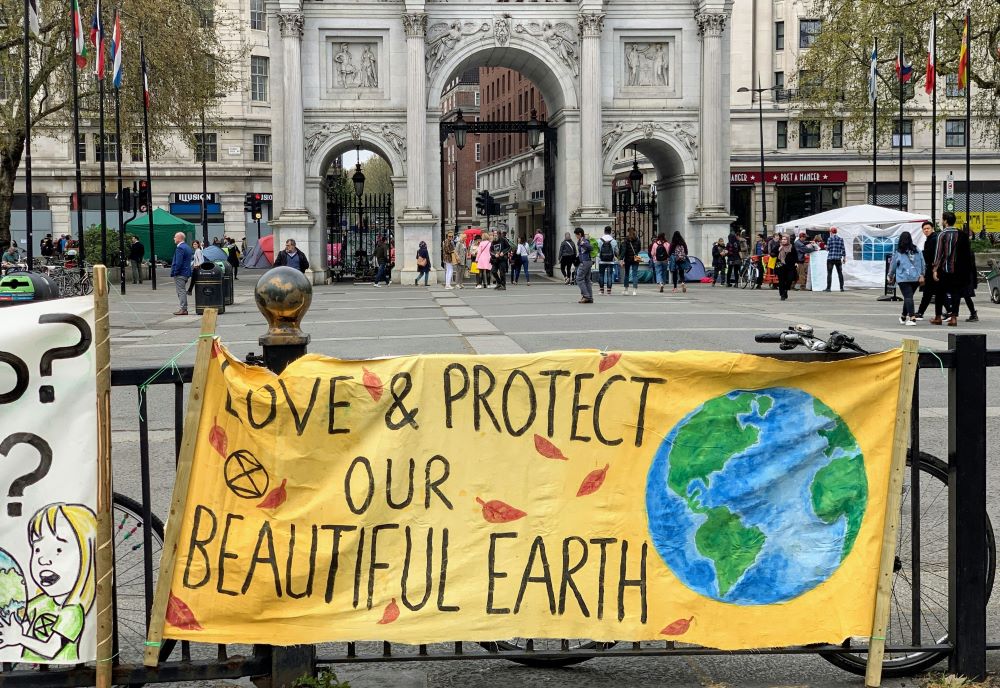
(Unsplash/John Cameron)
Many clergy seem to avoid hot-button topics in their homilies, writings or conversations, perhaps for fear of incurring outspoken dissent or criticism. This is understandable; many people prefer to avoid interpersonal conflict. Pastors are likely striving to do their job as amicably as possible, without fear that parishioners may take issue with their words and complain about them, or worse, be driven away from the church.
As someone who tends to be outspoken on issues of environmental justice, I have heard this concern during my own conversations with pastors over the years. I myself have incurred criticism and reproach from conservatives, who seem to be either uninformed or misinformed about how a healthy environment is necessary for all life, human or otherwise.
But with no dearth of hot-button topics these days — immigration, war, COVID, climate change — and with the coupling of religion and politics, the faithful, particularly our young people, yearn for spiritual direction from their church. Church leadership's avoidance of such topics not only withholds the moral guidance many seek (and that pastors are responsible for offering), but also denies opportunities for collective intercessory prayer.
Climate change remains unspoken in many faith communities.
Climate change is a good example, since it's an issue that should arguably be incontrovertible due to its science-based certainty and universal threat to humanity. Pope Francis, in documents like Laudato Si' and Laudate Deum, recognizes climate change as a grave moral concern requiring urgent action.
Nevertheless, climate change remains unspoken in many faith communities. It's one of many social justice issues perceived as politically charged, generally considered a "liberal" issue. Thus, climate change, and more broadly care for creation, fails to make prime time at Masses and marches.
For example, during last year's United Nations' climate change conference, COP28, I submitted to my parish a Mass intention for its success. Regrettably, this was not accepted, even though international agreements on climate change are critical to alleviating the suffering and death of millions (born and unborn). At the time, the pope himself expressed a strong desire for COP28 to be "a breakthrough" and "a turning point" for progress on climate action.
There are three problems with this overly cautious approach to preaching the truth and praying about hot topics, even those of moral significance to human life and dignity, like climate change.
First, one of the charges of our ordained religious is to be a "voice crying out in the desert" (Mark 1:3) in today's world that prioritizes wealth, power and individualism over charity, humility and the common good. When sheep are led astray, whether by choice or deception (read: disinformation, which is rampant about the climate crisis), it's the shepherd's job to bring them back into the fold and onto the right path.
History is replete with saints who told it like it was, who emphatically conveyed deep truths to the wayward faithful without fear of retribution or even death, however probable. Jesus himself overcame fear by accepting his awesome task to serve the Father and lead God's children to eternal salvation: "Not my will, but yours be done." So, any proclamation of the truth, regardless of its political hotness, should take priority over possible judgment by others or other risks.
The second problem with reluctance to explicitly speak the truth is more political than theological. An unfortunate aspect of our American society in the 21st century is that even topics that would otherwise have been apolitical are now politicized. Again, climate change is a prime example. It is seen as an issue that aligns with one political party's priorities, not as one that aligns with Catholic values and about which Pope Francis himself has expressed grave concern.
Advertisement
Third, avoiding discussion of tough topics like climate change leads the faithful to remain uninformed, and thus not called to act. Climate action can include practical solutions like parish energy conservation, as well as prayers (e.g., "40 Days for Climate") and marches for climate action. Not taking action to alleviate climate change results in lost opportunities to help the poor and vulnerable who are most affected by it.
Because American politics have been tied to Christian values, one's positions on policy or even science have become a measure of their religious convictions. Consequently, if someone advocates for climate action in the U.S., many see it as politically motivated rather than an expression of faith.
In this era of unjustified politicization of faith and values, clergy and all people of faith must profess Christ's message without fear: That is, the message of love, service and the common good. Fear of speaking truth can thus inhibit the spread of the Gospel message.
It's up to each of us to recognize the truth — and then not be afraid to shout it from the mountaintops! Let us hope and pray that the religious and laity alike accept their call to be proclaimers of truth, regardless of any consequences.




